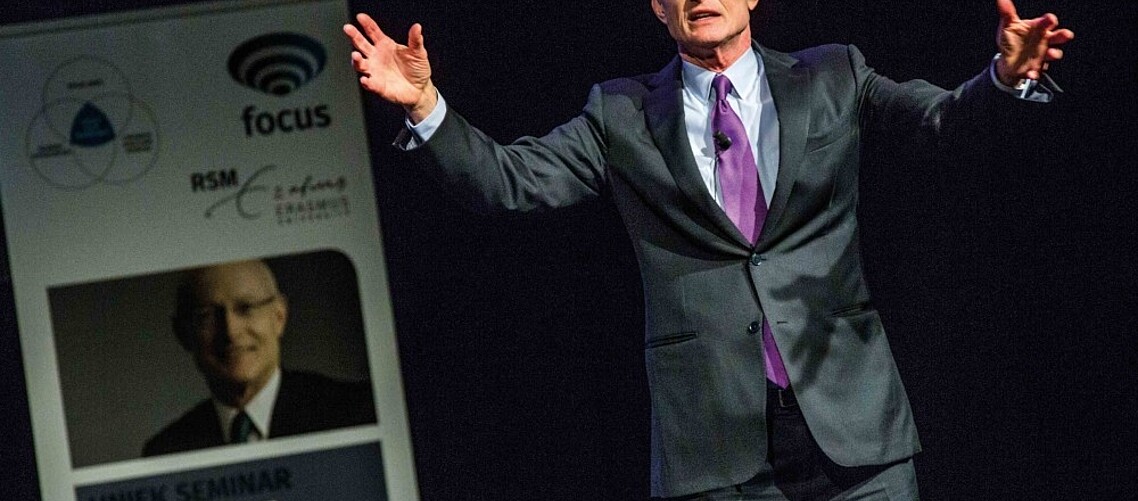In his introduction of Michael Porter at the event Creating Shared Value: business must compete to change the world, which took place in Rotterdam last May, Pursey Heugens, RSM professor of organisation theory, development, and change said: ‘Michael has been able to continuously reinvent himself, investing in the conceptual tools and global measurement strategies that have made his ideas measurable and actionable.’ He went on to note the ‘continuing relevance of the ideas Michael has given us through his research, teaching and consultancy’.
‘Next evolution in capitalism’
With the publication in 2011 of the article Creating Shared Value (CSV) in Harvard Business Review, Porter introduced an elegantly simple proposition to address the uncertain tides of global business while simultaneously solving society’s most pressing issues. CSV is ‘the next evolution in capitalism’ according to the HBS Institute for Strategy & Competitiveness, of which Porter is director.
‘Societies everywhere are facing significant social, environmental and economic challenges,’ he said. ‘Governments and NGOs lack sufficient resources, technology and capabilities themselves to fully meet these challenges alone.’ Only business is equipped to create large-scale positive change and economic prosperity, according to Porter. And CSV is the new approach business has been searching for.
What is CSV?
According to the Harvard Business School Institute for Strategy and Competitiveness website: ‘The next transformation of business thinking lies in the principle of shared value: creating economic value in a way that also creates value for society by addressing its needs and challenges.
‘What is shared value? Corporate policies and practices that enhance the competitive advantage and profitability of the company while simultaneously advancing social and economic conditions in the communities in which it sells and operates. Shared value is not corporate social responsibility, philanthropy, or even sustainability, but a new way to achieve economic success.’
During his presentation to an audience comprising senior managers in business and the healthcare industry, Porter described the trajectory of business’s engagement with society – earnest but largely ineffective. Philanthropy – charity – is the oldest model of business helping society: donations of money and time to a “good cause” is not particularly scalable.
Are we solving anything?
Over the past 15 years corporate social responsibility (CSR) has become the focus of “good”, a needed intervention after major scandals involving economic, governance and ecological issues. ‘CSR says we’ve got to go further than just giving money, we have to change the way we engage with society,’ Porter said. He is enthusiastic about sustainability as one of the CSR tenets that business must embrace. ‘We’ve got to think about the consequences of what we’re doing today so we can keep making profit. We need a more sustainable long-term view of our companies in order to not harm society in pursuit of short-term economic success.’
However once again, while CSR is good, it hasn’t actually solved any big societal problems. And that bothers Porter. ‘I started worrying about what we would actually do to solve these problems because governments and NGOs can’t solve them and what we’re doing in business today isn’t going to solve them.’
CSV is the answer
The answer to these societal issues has been staring business in the face – but it requires a new way of thinking about how we do business. CSV means addressing societal needs and challenges through business itself, with a business model – and making a profit.
‘Shared value says there is no conflict between meeting social needs and making a profit,’ said Porter. ‘In fact some of the greatest opportunities for business are meeting the unmet needs of society.’
The three levels of CSV:
1 Reconceiving needs, products and customers
– Meeting societal needs through products
– Serving unserved or underserved customers
2 Redefining productivity in the value chain
– Utilising resources, energy, suppliers, logistics and employees differently
3 Improving the local and regional business environment
– Improving skills, the supplier base, the regulatory environment and the supporting institutions that affect the business
– Strengthening the cluster on which the company depends
Again, it is the mindset of business that must shift, said Porter. ‘We have to take social problems from the side of what business and capitalism are, and put them in the core of what we do,’ he said. ‘This is transformational. And as CSV starts to get more and more momentum and traction, we are starting to see huge impact – with such organisations as Nestlé, Novartis and numerous regional banks and insurance companies. I guarantee you that every single organisation in the room can do this, but you’ve got to understand where you can play. Shared value has to do with your particular company, your particular business, your particular skills, your particular assets. Societal deficits create costs for us – we want society to be effective and efficient, that’s better for business.’
The punch line
As ever, Porter wants to deliver “the punch line” to drive the point of creating shared value into the minds and hearts of business. ‘The message is that we are in business to create economic value and prosperity. If we don’t there will be no prosperity, only business can create that. And profit is not bad. Profit is actually the key to everything, the key to prosperity but also to scalability and sustainability. We can’t be ashamed of that – we have to celebrate how important it is when we can do that. But we’ve got to do it in a way that also creates shared value for society, and doesn’t erode value for society. Business acting as business is arguably the most powerful force for addressing many of society’s pressing issues and needs.’
This article was first published in RSM Outlook winter 2016 – RSM’s alumni and corporate relations magazine. You can download RSM Outlook here.
